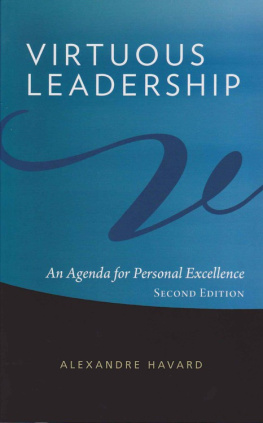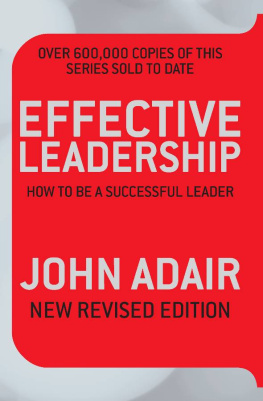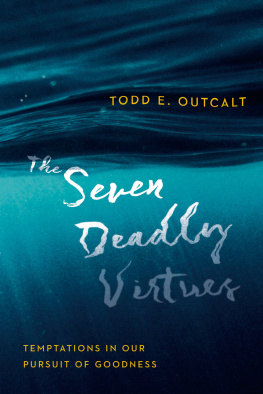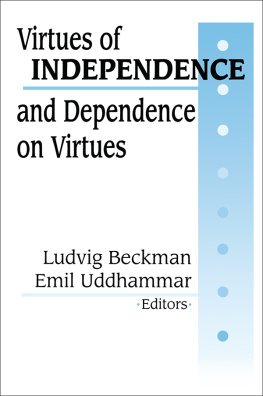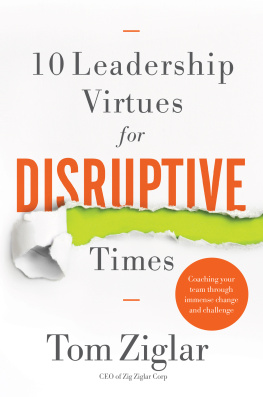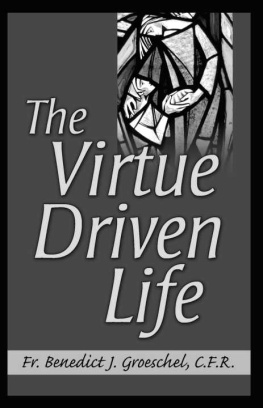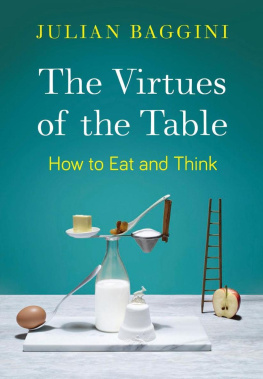VIRTUOUS LEADERSHIP
An Agenda for Personal Excellence
VIRTUOUS LEADERSHIP
An Agenda for Personal Excellence
BY ALEXANDRE HAVARD

About the Author
Alexandre Havard is the author of the Virtuous Leadership model and the founder of the Havard Virtuous Leadership Institute (www.hvli.org). Born in Paris, he is a barrister by profession having graduated from the Ren Descartes University, one of Frances leading law schools, and practiced law in several European countries. He is now living and working in Moscow where he offers seminars in Virtuous Leadership to senior business executives and university students. His book Virtuous Leadership (New York, 2007) has been translated into 15 languages, including Chinese, Russian, French, and Spanish. Alexandre Havard is also the author of Created for Greatness: The Power of Magnanimity (Washington, 2011).
Scripture texts from the New and Old Testaments are taken from The Holy Bible Revised Standard Version Catholic Edition, 1965 and 1966 by the Division of Christian Education of the National Council of the Churches of Christ in the United States. All rights reserved. All copyrighted material is used by permission of the copyright owner. No part of it may be reproduced without permission in writing from the copyright owner.
Permission to quote copyrighted material is grately acknowledged to publishers and authors as follows: Simon & Schuster for quotations from The 7 Habits of Highly Effective People, by Steven Covey, 1995. Random House, Inc., for excerpts from The Life of Robert Schuman, by Mary Schuman, 1965.
Cover and Text Design: Rose Design
2007 Alexandre Havard
Published by Scepter Publishers, Inc.
www.scepterpublishers.org
All rights reserved
Second Edition, 2014
ISBN: 978-1-59417-204-5
Printed in the United States of America
To my grandparents,
Madeleine and Artchil, Nina and Pavel
ACKNOWLEDGMENTS
It was my happy lot to be born to and raised by people of exceptional virtue. That may sound corny to people of modern sensibility, but its true. I refer to family members, beginning with my excellent parents and their parentsimmigrants to France from the Soviet Union. They were people of heart who lived magnanimity, humility, prudence, courage, selfcontrol, and justice as naturally as they breathed.
This book reflects their influence and that of some of the world leaders of my high school and university years who inspired me by their sterling moral example. Aleksandr Solzhenitsyn stands out, although I could name others, such as Pope John Paul II.
I grew up in revolutionary Paris of the late 60s and early 70s. Support for Red revolution was ubiquitous among the educated and semi-educated alike. The pampered children of Paris finest arrondissements knew what they wantedCommunism. Most rejected the corrupt and flabby Brezhnevite dispensation in favor of the rigors of Maoist max i m alism. For them, it was all or nothing. Their enthusiasm for Communism was surpassed only by their utter ignorance of life behind the Iron and Bamboo Curtains.
Solzhenitsyns Gulag Archipelago burst on this scene like a thunderclap. The book exposed its moral pretentiousness, not to say vacuity, and washed it away like a sandcastle at high tide. The Russian authors heroic witness to truth, his astonishing courage in the face of evil, and his attachment to Christian moral preceptsso bracingly counter-cultural made him seem far more youthful and relevant and attuned to the needs of the times than those clueless students on the barricades. He will always be seen by posterity in Russia and abroad as a paragon of virtuous leadership.
The other great inspiration of my lifethe greatest, in facthas been a Spanish priest and saint of the Roman Catholic Church: Josemara Escriv, the founder of Opus Dei. He taught me that Christs famous commandment be perfect as thy Heavenly Father is perfect (Matthew 5:48)was addressed to me and to each and every one of His followers for all time; that it means living by the human and divine virtues; that the personal excellence to which Christ calls all of humanity is achievable, even by me. Saint Josemara devoted his life to helping his children achieve this noble objective. His teaching, his example, and his spirit inform this book from start to finish.
I should like to thank my dear parents for their selfless love and support. They contributed to the book in many ways, great and small.
A number of other friends and colleagues contributed their professional advice and assistance, and for this I thank them. These include Joe Villagran, Michael OBrien, Radosaw Koszewski, Oskari Juurikkala, Mark Hamann, Josemara Camean, Lembit Peterson, is Rudolf Larenz, Don Juan Jos Sanguineti, Don Horacio Antunez, Varro Vooglaid, Sardor Nasyrov, and Rodrigo Preciado.
Above all, I should like to thank Anthony Salvia, whose contribution to every aspect of this book was so profound as to make him its virtual co-author. To him, my endless gratitude.
Last but by no means least, I should like to thank John Powers, of Scepter Publishers, Kevin Lay, who first read the manuscript, (insightfully), to Tony Salvia who made painstaking efforts to improve the English, and Russell Shaw, who edited the final manuscript. I am also grateful to Siobhan Hardy, whose cover design is the last word in graphic urbanity.
Needless to say, responsibility for any and all errors and/or shortcomings rests solely with the author.
CONTENTS
Dont flutter about like a hen, when you
can soar to the heights of an eagle.
JOSEMARA ESCRIV, THE WAY, NO. 7
A random incident, as beautiful as it was unexpected, comes to mind whenever I contemplate the greatness of the human heart, which is the sine qua non of leadership and the very subject of this book.
It occurred on a bus journey from Saint Petersburg to Helsinki on a bitterly cold winters morning in 1992, not long after the fall of Communism. This was a time of plunging production, skyrocketing inflation, and rampant unemployment throughout the former Soviet Union. Elderly Russians found themselves in especially dire straits as inflation wiped out their already inadequate pensions. Many were reduced to collecting discarded bottles from waste bins for the deposit money. It was their only way to survive.
As the Finland-bound bus sped through Russia, I was struck by the contrast between the pristine winter landscape hurtling past my window and the less than edifying moral atmosphere on board.
The passenger in front of me was sloshed. He appeared to be comatose.
The passenger to my right thrust his hand into his pocket and came up with a crumpled pack of cigarettes. He regaled me with stories of a lost weekend of carousing, as he chafed at not being able to light up.
Much to his relief, our bus put in for a rest stop in front of the railway station at Vyborg, the last Russian city before the Finnish frontier. With the sun shining brightly on newly fallen snow, I bundled up against the cold and set out to explore the area around the station.
Presently I came upon an old lady rummaging through a large pile of refuse to find something she could use or sell or cash-in for the deposit. I reached into my pocket and came up with my few remaining rubles: Babushka, please take these. She looked me straight in the eye and smiled radiantly, and I could see that she was younger than she appeared. Anxious not to miss the bus, I made my way quickly back to the station.
Just as I was stepping aboard, I heard a voice behind me. I wheeled around. It was the old lady trundling towards me as fast as she could, a beaming smile on her face and a bouquet of flowers in her outstretched hand. I accepted it. She left without saying a word.
Next page
